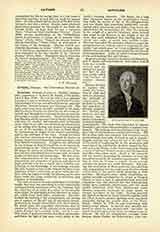

Lavabo, the first word of that portion of Ps. xxv said by the celebrant at Mass while he washes his hands after the Offertory, from which word the whole ceremony is named.
The principle of washing the hands before celebrating the holy Liturgy—at first an obvious practical precaution of cleanness, then interpreted also symbolically—occurs naturally in all rites. In the Eastern rites this is done at the beginning as part of the vesting; it is generally accompanied by the same fragment of Ps. xxv (vv. 6-12) said in the West after the Offertory. But in the “Apost. Const.”, VIII, 11, the hands of the celebrants are washed just before the dismissal of the catechumens (Brightman, 13), in the Syriac and Coptic rites after the creed (ib., 82 and 162). Cyril of Jerusalem also mentions a washing that takes place in sight of the people (Cat. Myst., v). So also in the Roman Rite the celebrant washes his hands before vesting, but with another prayer (“Da, Domine, virtutem”, etc., in the Missal among the “Orations ante Missam”). The reason of the second washing, during the Mass, at Rome was no doubt the special need for it after the long ceremony of receiving the loaves and vessels of wine from the people at the Offertory (all of which is absent from the Eastern rites). The first Roman Ordines describe a general washing of hands by the celebrant and deacons, who have received and carried the offerings to the altar, immediately after they have done so (“Ordo Rom. I”, 14; “Ordo of St. Amand” in Duchesne, “Origines du Culte”, 443, etc.; in the St. Amand Ordo the Pontiff washes his hands both before and after the Offertory). There is as yet no niention of any psalm or prayers said at the time. In the Gallican Rite the offerings were prepared before Mass began, as in the East; so there was no Offertory nor place for a Lavabo later. At Milan there is now an Offertory borrowed from Rome, but no washing of hands at this point; the Mozarabic Liturgy also has a Romanizing Offertory and a washing, but without any prayer (“Missale Mixtum”, P.L., LXXXV, 538). The Roman Rite had in the Middle Ages two washings of the hands at the Offertory, one just before, while the deacon spread the corporal on the altar, one immediately after the incensing that follows the offertory (Durandus, “Rationale“, IV, 28; Benedict XIV, “De SS. Missae Sacrif.”, II, 11). The first of these has now disappeared. The second was accompanied by the verses 6-12 of Psalm xxv. This psalm is first mentioned by the medieval commentators (e.g. Durandus, loc. cit.). No doubt it was said from very early times as a private devotion obviously suitable for the occasion. We have noted that it accompanies the washing before the Liturgy in the Byzantine Rite. Benedict XIV notes that as late as his time (eighteenth century)”in some churches only some verses are said” (loc. cit.), although the Missal requires that all (that is from v. 6 to the end) be recited. Cyril of Jerusalem (loc. cit.) already explains the washing as a symbol of purity of the soul; all the medieval writers (Durandus, loc. cit.; St. Thomas Aquinas, “Summa Theol.”, III, Q. lxxxiii, art. 5, ad 1um; etc.) insist on this idea.
The present rule is this: At high Mass (or sung Mass), as soon as the celebrant has incensed the altar after the Offertory and has been incensed himself at the Epistle side, he remains there while his hands are washed by the acolytes, who must be waiting by the credence table. The first acolyte pours water from the cruet over his fingers into the little dish provided, the second then hands him the towel to dry the fingers. Meanwhile he says: “Lavabo inter innocentes”, etc., to the end of the psalm, with “Gloria Patri” and “Sicut erat”. The Gloria is left out in Masses for the dead and in Masses de tempore from Passion Sunday to Holy Saturday exclusively (“Ritus celebrandi”, VII, 6, in the Missal). A bishop at high Mass wears the “precious” mitre (mitra pretiosa) while he is incensed and washes his hands (Caerim. Episc., II, 8, 64); in this case a larger silver jug and basin are generally used, though the “Caerimoniale Episcoporum” does not mention them. At low Mass, since there is no incense, the celebrant goes to the Epistle side and washes his hands in the same way immediately after the prayer “Veni sanctificator”. For his convenience the altar card on the Epistle side contains the prayer said when the water is blessed before it is put into the chalice (“Deus qui humane substantiae”) and the verses “Lavabo”, etc.
ADRIAN FORTESCUE

